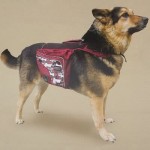Written by Senior Editor Peter Gehr
Best Puppy Yorkshire Terrier: World’s smallest therapy dog has been acknowledged in New Jersey. The amazing thing about this little pooch is that she’s a working dog! Lucy is a 2.5lb working dog visiting needy people, sick and elderly, this little puppy is now in the Guinness World Records as the tiniest assistance dog in the world.
Affectionately known as a Yorkie, this breed was first brought into the USA around the 1870s. The first account goes back to that era where new Americans were following the trends from England, and, as their name implies, these little pooches originally came from Yorkshire in the United Kingdom.
Best Puppy Yorkshire Terrier: World’s Smallest Therapy Dog
A Yorkshire Terrier weighing just 2.5lbs is officially the smallest working dog in the world.
A Yorkshire Terrier from New Jersey in the US has been named the world’s smallest working dog.
Three-year-old Lucy is 5.7 inches high and weighs just 2.5lbs, which is less than 12 sausages. However, despite her tiny size, she still works hard and is a therapy dog with volunteer group Leashes of Love.
She travels around hospitals, special schools and nursing homes in her local area visiting elderly and disabled residents, which earned her the Guinness World Record for being the smallest working dog on the planet.
Lucy’s owner Sally Leone Montufar, 56, stated: “I said I bet she’s not the tiniest, but I’m sure she’s the tiniest therapy dog.”
She also described the moment she found her pet, explaining a woman came into the boutique where she works to see if anyone wanted a dog before they were taken to a shelter.
Lucy was hiding away in a handbag and Ms Montufar claimed it was love at first sight.
“She was so pitiful and lethargic I couldn’t leave her,” she added.
Even if they are not as tiny as Lucy, small dogs still need special care and attention, especially when it comes to their diet.
High-quality food is essential for breeds like Yorkshire Terriers. Because their stomachs are smaller, they eat less and therefore need the right nutrients to stay fit and healthy. Click here to visit the original source of this post
Best Puppy Yorkshire Terrier: World’s smallest therapy dog, and a pint sized pooch needs the right feeding regimen to keep her healthy and to keep those little bones strong. A smaller kibble nutrient rich dog food will provide the goodies the miniature dogs needs for good health and well-being. Extra care needs to be taken with such a small dog, and keeping an eye out to be sure not to step on its little feet, or get too close to aggressive dogs who may not be trustworthy around your Yorkie.


